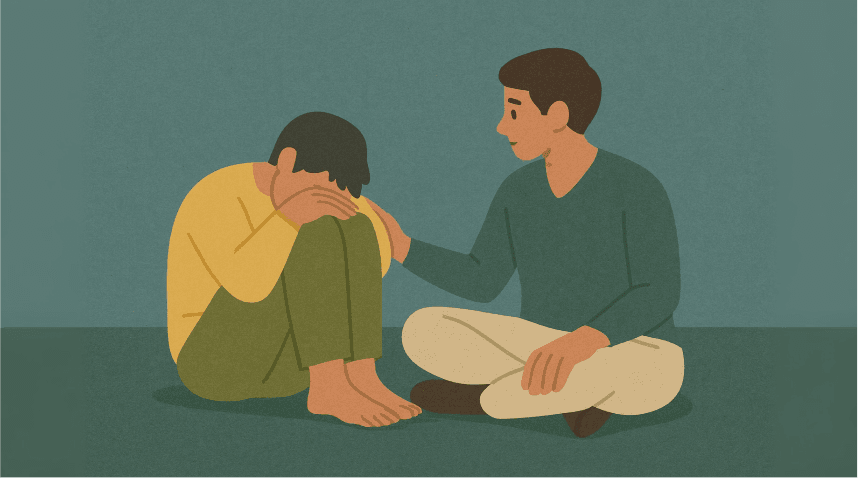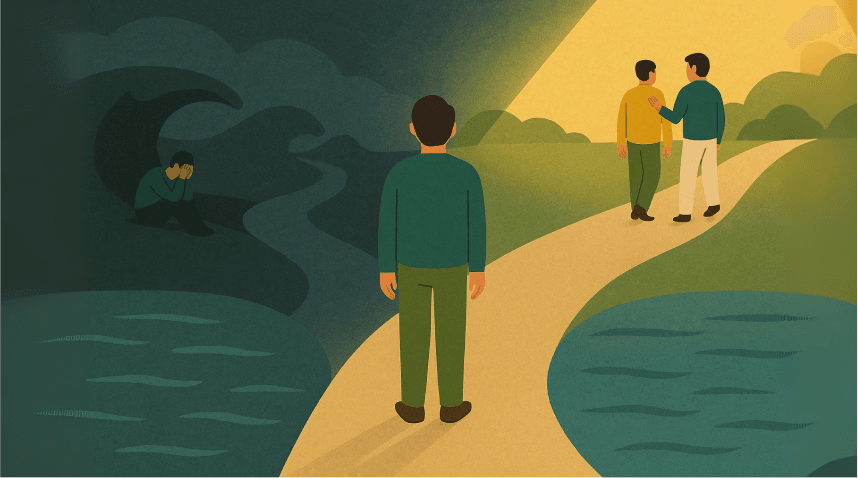TL;DR Therapy isn’t separate from the Buddhist path—it can be part of it. Asking for help gives others the chance to practise compassion while helping you navigate suffering.
“But my friends are so busy, telling them my problems is just going to drag them down.”
“I don’t want to be a burden to my loved ones, I keep repeating my same problems to them”
If these thoughts sound familiar, if they’ve played on repeat in your head during particularly rough patches, this piece is for you.
I’ve been there too. Curled up on my bedroom floor at 2 AM, scrolling through my contacts and wondering if anyone would actually want to hear about the mess I’d made of things. Again. The weight of feeling like a broken record, cycling through the same anxieties with the same patient friends who probably had their own problems to deal with.
But here’s what I’ve learned about reaching out for help, viewed through the lens of Buddhist wisdom that I’ve slowly—sometimes reluctantly—come to appreciate.
The Mind as an Ocean
Some Buddhist teachers describe the mind as being like the ocean, vast, deep, and layered. On the surface, the ocean is constantly shifting, tossed by waves, winds, and changing weather.
We experience sudden storms: difficult workdays that leave us drained, strained relationships that keep us up at night, moments of crushing self-doubt.
But here’s what took me years to understand. The deeper you go, the quieter it becomes. Beneath all that surface agitation, there’s a space of calm and clarity that remains untouched by the chaos above.
This doesn’t mean we ignore the surface storms or pretend they’re not real. Trust me, I’ve tried that approach, it doesn’t work. It means we learn how to anchor ourselves amidst the turbulence. Meditation and reflection become like diving beneath the waves, touching that calm centre that’s always available, even when it feels impossibly out of reach.
Remember, the goal isn’t to eliminate all waves. It’s not to get lost in them. We are not our thoughts or emotions. Like waves, they rise, change form, and pass.
The ocean remains.
Why It’s Wise to Seek Guidance

In the suttas, the Buddha repeatedly encouraged spiritual friendship and community. He understood something essential. We don’t grow in isolation.
While Ananda was the Buddha’s attendant for many years and was known for his devotion and memory, the Buddha did correct him on occasion. One notable instance is when Ananda stated that spiritual friendship was “half of the spiritual life.”
“Don’t say that, Ananda. Don’t say that. Admirable friendship, admirable companionship, and admirable camaraderie is actually the whole of the holy life. When a monk has admirable people as friends, companions, & comrades, he can be expected to develop & pursue the noble eightfold path.” – The Buddha, in Upaddha Sutta
No one sails rough seas alone. Not safely, at least. Just as a skilled captain consults maps, stars, and seasoned navigators, we too benefit from turning to those who can support us when the journey gets difficult.
Does asking for help make me ‘Unbuddhist?’

For many Buddhist practitioners, the question of whether to seek professional mental health support can feel fraught with spiritual implications. Does reaching out for help contradict the teaching of seeing suffering, not identifying with it, and navigating it with equanimity?
Are therapy and medication at odds with meditation and mindfulness? These concerns, while understandable, may stem from a misunderstanding of what the Buddha actually taught about human suffering and our response to it.
The Assu Sutta (SN 15.3) offers an honest depiction of human suffering in Buddhist literature. Rather than minimising pain, the Buddha acknowledged its vast scope across lifetimes, telling his disciples that the tears shed from losing mothers, fathers, children, and loved ones throughout our existences would exceed “the water in the four great oceans”.
In the Nibbhedika Sutta (AN 6.33), the Buddha then described two possible outcomes of suffering:
- “It is when someone who is overcome and overwhelmed by suffering sorrows and wails and laments, beating their breast and falling into confusion.”
- “Or else, overcome by that suffering, they begin an external search, wondering: ‘Who knows one or two phrases to stop this suffering?”
The Buddha explained that suffering results either in (1) confusion or (2) an external search. This distinction reveals that seeking external help when suffering becomes unbearable isn’t spiritual failure, but rather, can be a wise choice. A choice to actively pursue answers rather than remain trapped in confusion.
In line with this, pursuing professional mental health care can indeed be a constructive response to pain, representing the same fundamental human impulse that led people to seek the Buddha’s teachings in the first place.
Some challenges in life are simply too heavy to carry alone. Whether it’s persistent stress that makes your chest tight, burnout that leaves you feeling hollow, or old emotional wounds that keep resurfacing when you least expect them. It’s not a failure to ask for help.
By asking for help we also give a ‘generosity/dana’ opportunity for our friends/loved ones/therapists to practice their patience or empathy with us.
The Buddha never shamed suffering. He even sought out those in pain and taught them the path like Yasa, who was disillusioned with his materially rich life.
We can do the same, with ourselves and others.
Why seek therapy? Can’t I meditate my problems away?
One might be shy to accept that they have a challenge they can’t battle alone. Trying to ‘meditate’ away your problems is like applying a band-aid to a wide, gaping wound. Living life intentionally on hard mode doesn’t equate to a promised payoff at the end of the horizon.
If we are struggling and in a bad place, seeking therapy or even other psychological professionals is like applying a stitch to a gaping wound. Mental health professionals are equipped to respond to the specific problem you have, rather than a Reddit forum.
Once the mind is settled out of the emergency it found itself in (e.g. suicide ideation), the Dhamma can then come in to support your recovery.
Everyone is different, so either having the Dhamma side by side with your treatment or dipping your toes into Dhamma after having therapy is up to the individual.
See Ajahn Dhammasiha’s reply to a question on mental health here.
Therapists as Supports

The idea of the community that supports our path is at the heart of the Buddhist path.
Friends who truly listen. Mentors who guide us. Or even a good therapist who offers presence and clarity when we need it most. Mental health professionals, in this light, are not separate from the path. They are part of it.
A therapist is like a skilled navigator. Someone trained to help you understand the terrain of your mind, spot patterns you can’t always see, and explore difficult memories or emotions safely.
The Buddha himself sought out teachers before his awakening. He didn’t isolate himself from learning. He embraced guidance.
There is no contradiction between walking the spiritual path and seeking psychological support. In fact, they often work beautifully together. Reaching out to a therapist doesn’t mean you’re broken or weak. It means you’re ready to understand your suffering better and live with more awareness and freedom.
Taking the First Step: How to Reach Out
If you’re thinking about speaking to a professional, here’s a simple yet thoughtful template that can be tweaked for your specific context.
Dear [Therapist’s Name],
I recently came across your profile on the [clinic name] website and would like to enquire about therapy.
For context, I’m a [man/woman] in my twenties/thirties based in Singapore, seeking support primarily for managing work and general life stress.
Could you kindly help with a few practical queries?
- Do you offer therapy sessions during weekends or weekday evenings?
- What are your current fees?
- Is there a convenient appointment booking system (like automated online scheduling), or should I book manually via text or email?
- Typically, what’s the wait time for appointments?
- Where do sessions usually take place?
- Does your clinic participate in the NEHR?
Thank you very much—I look forward to your reply.
Warm regards,
[Your Name]
A Journey Guided by Compassion
Lastly, always remember: a good therapist, like a lighthouse, guides without judgment, shining a clear path through rough waters. By choosing to seek help, you’re recognising your journey towards wisdom and compassion, benefiting not only yourself but all around you.
May your path be filled with insight, peace, and true well-being.
Speaking of the ocean where we first started off, Ayya Khema shares the following: “The Buddha said his teaching was like the ocean. When we approach it from the shore, it is shallow at first. We can just wet our feet. As we go into it deeper and deeper we are eventually engulfed and finally totally swallowed by it.
Just so is the teaching. We start out just wetting our big toe to see what the temperature is. Maybe trying meditation for half a day, then two days, until we finally have the courage to come to a ten-day meditation course and sit through all of it. We learn the teaching little by little until eventually our whole life is dominated by it.”
May you grow in blessings.
Wise Steps
- Realise that there is calm to be reached, deep down, past the turmoil and worry
- Remember that spiritual friendship is half of the spiritual life, that companionship and company is wholesome and healthy
- Have the humility and awareness to recognise therapy as rapid and helpful triage, that can be aided in long-term by our spiritual practice.


